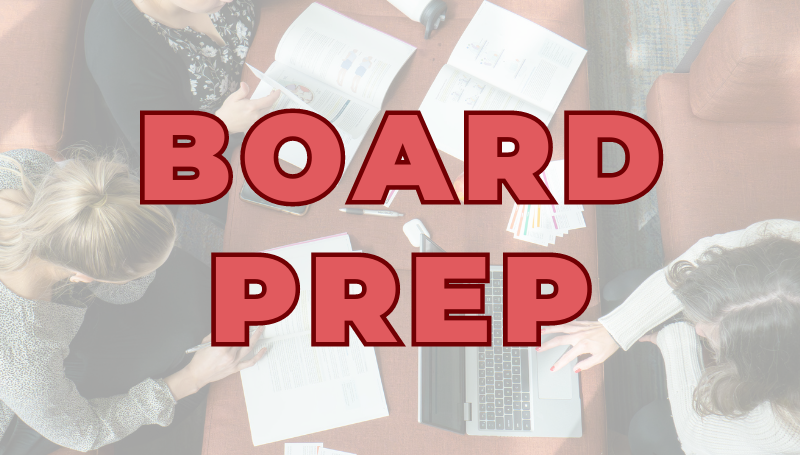
If you’re preparing for an ABIM exam or studying for ABP boards, you may have already started your review, and that’s great! You may have started creating a study plan for the year and maybe you’ve even done some light reading. These 9 tips will help you enhance the time you set aside for studying and get ready for the day of your exam, inspired by our StudyWise guide.
1. Find your knowledge gaps

A knowledge gap in a topic is the difference between what you know about that topic and what there is yet to learn and remember about it. Identifying these gaps can be tricky. Not sure where to start? Self-testing is the best way to identify knowledge gaps.
Pro Tip: Try selecting all topics in a session of the Q&As to identify which topics you need to brush up on, then read through those topics in the Core!
2. Explain topics to a friend or colleague

Have topics you're struggling with? Try explaining it to a friend or family member—you can even explain it out loud to yourself. That might sound weird, but talking through tough topics can do wonders to help you remember.
Plus, explaining it out loud can help you to identify where you get stumped or where the gap in knowledge lies.
3. Change-up your study environment

Have you heard that studying in a variety of places is actually the way to go? When you experience an event, all the information is funneled to the hippocampus and converted into a neural code that can be stored and accessed, first as working (short-term) memory and later as long-term memory. This process is called encoding. Your episodic memory contains all relevant information of the event—the “who, what, when, why, and where,” the emotions, the sensations, and the personal importance of that event. Encoding improves when studying in varying surroundings and with mild distractions.
4. Use this free tool to plan, plan, plan!

Try to start early and make a plan! One way to do this is to use the MedStudy Personal Trainer. (It’s a completely FREE tool you can access from your myMedStudy account.) All you have to do is fill out some info like, “When will you be taking your exam?” And Personal Trainer will set up a study schedule for you.
Creating a study plan will help you with practicing spaced retrieval, which is a learning technique where you recall information about different topics at varying intervals of time.
This is crucial for making new information easily accessible in your long-term memory. An example of this would be to plan to study Cardiology in Qbank+ three times, with progressively longer intervals of time between Q&A sessions. Each time, the information will become more durable and more easily retrieved.
5. Prepare early so you can sleep more

We’re sure you know that it’s important to get a good night’s sleep before learning something new. But did you know sleep is just as important after learning? That’s because a vital part of learning, called consolidation, actually happens while you sleep.
One way to ensure you’ll get enough sleep is to embrace a nightly routine. For example, you could make it a nightly routine to pull your wardrobe, pack your gym bag, and prepare your lunch for the next day. Then you can actually get some rest knowing you’re prepared for the morning!
6. Use creative strategies to get and stay motivated

Having trouble keeping your head in the game? A great way to keep yourself motivated over a long period of time is to set smaller, realistic goals you can achieve along the way. Reward yourself with a snack or some free time when you meet each of these goals to keep yourself engaged and excited.
One of our favorite tips to keep yourself motivated is to remind yourself why you are studying so hard! Before you start on your study journey, take a minute to think about your “why”, write it down, and put it somewhere where you will see every time you study. Leave a note in your study space, or if you plan on studying in different places put it on a sticky note on your laptop or a note in your bag.
7. Keep the blueprint of your upcoming exam in mind

Scale which topics you study based on your exam’s blueprint or content outline. For example, if you’re an Internist, you should put in a lot more study time for Cardiology (since it’s a whopping 14% of the ABIM exam content), and can scale back the time you spend studying Otolaryngology and Dental Medicine (1% of the exam) to accommodate.
This strategy is especially helpful when you’re getting closer and closer to your exam date because knowing the blueprint will help you tailor your effort towards the bigger sections of the exam. You should still study each of the less-represented areas to make sure you have a general understanding of the content.
8. Attend a MedStudy Course to hear from different speakers for each topic

Our courses aren’t taught by only one speaker—we find engaging specialists in each topic to give you a board-focused review. You’ll have different physicians reviewing each topic, so you don’t have to sit through only one lecturer to get your comprehensive review before boards.
9. Familiarize yourself with StudyWise

We’ve spent years optimizing an evidence-based approach to studying that's interwoven into all content: The MedStudy Method. It guides you through the best way to transfer the vast amount of medical material you need to know into readily accessible long-term medical knowledge.
Our study materials are formatted to work hand-in-glove with these powerful learning principles. Read all about it in the free StudyWise guide. It takes you through our current understanding of the memory process, best evidence-based study techniques, and the MedStudy Method.



